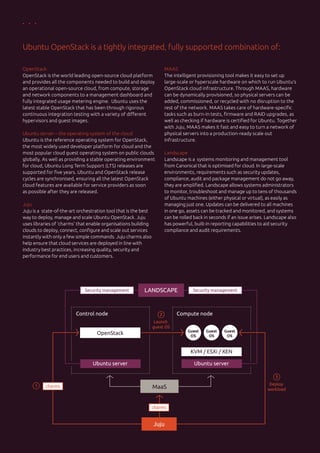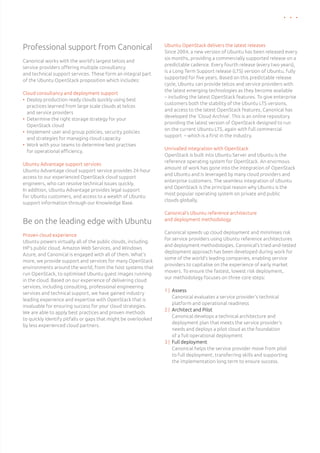Cloud Factsheet Ubuntu Open Stack
- 1. OpenStack Build, manage, scale out. Fast.
- 2. Ubuntu OpenStack is a tightly integrated, fully supported combination of: OpenStack OpenStack is the world leading open-source cloud platform and provides all the components needed to build and deploy an operational open-source cloud, from compute, storage and network components to a management dashboard and fully integrated usage metering engine. Ubuntu uses the latest stable OpenStack that has been through rigorous continuous integration testing with a variety of different hypervisors and guest images. Ubuntu server ¨C the operating system of the cloud Ubuntu is the reference operating system for OpenStack, the most widely used developer platform for cloud and the most popular cloud guest operating system on public clouds globally. As well as providing a stable operating environment for cloud, Ubuntu Long Term Support (LTS) releases are supported for five years. Ubuntu and OpenStack release cycles are synchronised, ensuring all the latest OpenStack cloud features are available for service providers as soon as possible after they are released. Juju Juju is a state-of-the-art orchestration tool that is the best way to deploy, manage and scale Ubuntu OpenStack. Juju uses libraries of ¡®charms¡¯ that enable organisations building clouds to deploy, connect, configure and scale out services instantly with only a few simple commands. Juju charms also help ensure that cloud services are deployed in line with industry best practices, increasing quality, security and performance for end users and customers. MAAS The intelligent provisioning tool makes it easy to set up large-scale or hyperscale hardware on which to run Ubuntu¡¯s OpenStack cloud infrastructure. Through MAAS, hardware can be dynamically provisioned, so physical servers can be added, commissioned, or recycled with no disruption to the rest of the network. MAAS takes care of hardware-specific tasks such as burn-in tests, firmware and RAID upgrades, as well as checking if hardware is certified for Ubuntu. Together with Juju, MAAS makes it fast and easy to turn a network of physical servers into a production-ready scale out infrastructure. Landscape Landscape is a systems monitoring and management tool from Canonical that is optimised for cloud. In large-scale environments, requirements such as security updates, compliance, audit and package management do not go away, they are amplified. Landscape allows systems administrators to monitor, troubleshoot and manage up to tens of thousands of Ubuntu machines (either physical or virtual), as easily as managing just one. Updates can be delivered to all machines in one go, assets can be tracked and monitored, and systems can be rolled back in seconds if an issue arises. Landscape also has powerful, built-in reporting capabilities to aid security compliance and audit requirements. Security management Security management Ubuntu server Guest OS Guest OS Guest OS KVM / ESXi / XEN 3 Control node LANDSCAPE charms Deploy workload 2 Launch guest OS Juju Compute node MaaS Ubuntu server 1 charms OpenStack
- 3. Professional support from Canonical Canonical works with the world¡¯s largest telcos and service providers offering multiple consultancy and technical support services. These form an integral part of the Ubuntu OpenStack proposition which includes: Cloud consultancy and deployment support ? Deploy production ready clouds quickly using best practices learned from large scale clouds at telcos and service providers ? Determine the right storage strategy for your OpenStack cloud ? Implement user and group policies, security policies and strategies for managing cloud capacity ? Work with your teams to determine best practises for operational efficiency. Ubuntu Advantage support services Ubuntu Advantage cloud support service provides 24-hour access to our experienced OpenStack cloud support engineers, who can resolve technical issues quickly. In addition, Ubuntu Advantage provides legal support for Ubuntu customers, and access to a wealth of Ubuntu support information through our Knowledge Base. Be on the leading edge with Ubuntu Proven cloud experience Ubuntu powers virtually all of the public clouds, including HP¡¯s public cloud, Amazon Web Services, and Windows Azure, and Canonical is engaged with all of them. What¡¯s more, we provide support and services for many OpenStack environments around the world, from the host systems that run OpenStack, to optimised Ubuntu guest images running in the cloud. Based on our experience of delivering cloud services, including consulting, professional engineering services and technical support, we have gained industry leading experience and expertise with OpenStack that is invaluable for ensuring success for your cloud strategies. We are able to apply best practices and proven methods to quickly identify pitfalls or gaps that might be overlooked by less experienced cloud partners. Ubuntu OpenStack delivers the latest releases Since 2004, a new version of Ubuntu has been released every six months, providing a commercially supported release on a predictable cadence. Every fourth release (every two years), is a Long Term Support release (LTS) version of Ubuntu, fully supported for five years. Based on this predictable release cycle, Ubuntu can provide telcos and service providers with the latest emerging technologies as they become available ¨C including the latest OpenStack features. To give enterprise customers both the stability of the Ubuntu LTS versions, and access to the latest OpenStack features, Canonical has developed the ¡®Cloud Archive¡¯. This is an online repository providing the latest version of OpenStack designed to run on the current Ubuntu LTS, again with full commercial support ¨C which is a first in the industry. Unrivalled integration with OpenStack OpenStack is built into Ubuntu Server and Ubuntu is the reference operating system for OpenStack. An enormous amount of work has gone into the integration of OpenStack and Ubuntu and is leveraged by many cloud providers and enterprise customers. The seamless integration of Ubuntu and OpenStack is the principal reason why Ubuntu is the most popular operating system on private and public clouds globally. Canonical¡¯s Ubuntu reference architecture and deployment methodology Canonical speeds up cloud deployment and minimises risk for service providers using Ubuntu reference architectures and deployment methodologies. Canonical¡¯s tried-and-tested deployment approach has been developed during work for some of the world¡¯s leading companies, enabling service providers to capitalise on the experience of early market movers. To ensure the fastest, lowest risk deployment, our methodology focuses on three core steps: 1 | Assess Canonical evaluates a service provider¡¯s technical platform and operational readiness 2 | Architect and Pilot Canonical develops a technical architecture and deployment plan that meets the service provider¡¯s needs and deploys a pilot cloud as the foundation of a full operational deployment 3 | Full deployment Canonical helps the service provider move from pilot to full deployment, transferring skills and supporting the implementation long term to ensure success.
- 4. About Canonical Canonical¡¯s platform team leads the Ubuntu project and brings together the passion and genius of the open-source community. Released every six months, each new edition of Ubuntu is better than the last, harnessing new technologies to make it quicker, easier and more intuitive than ever. Open-source software brings rich opportunities to business users. By providing custom engineering, support contracts and training, Canonical helps telcos and service providers around the world maximise their potential for reducing costs, improving efficiency and enhancing security with Ubuntu. Canonical works with hardware manufacturers like HP, Dell and Intel so Ubuntu can be delivered on the world¡¯s most popular devices. By working closely with original equipment manufacturers (OEMs) Canonical ensures that Ubuntu offers a premium user experience that takes full advantage of hardware functions. Open-source software relies on collaboration. That¡¯s why Canonical supports the development of tools that assist collaborative working, like Launchpad, Bazaar and Upstart. Find out more about Ubuntu OpenStack Please visit: ubuntu.com/cloud Ready to deploy an Ubuntu OpenStack cloud? Get in touch to find out how we can help you: ubuntu.com/cloud/contact-us ? Canonical Limited 2013. Ubuntu, Kubuntu, Canonical and their associated logos are the registered trademarks of Canonical Limited. All other trademarks are the properties of their respective owners. Any information referred to in this document may change without notice and Canonical will not be held responsible for any such changes. Canonical Limited, Registered in England and Wales, Company number 110334C Registered Office: One Circular Road, Douglas, Isle of Man IM1 1SB VAT Registration: GB 003 2322 47 CM-0016




